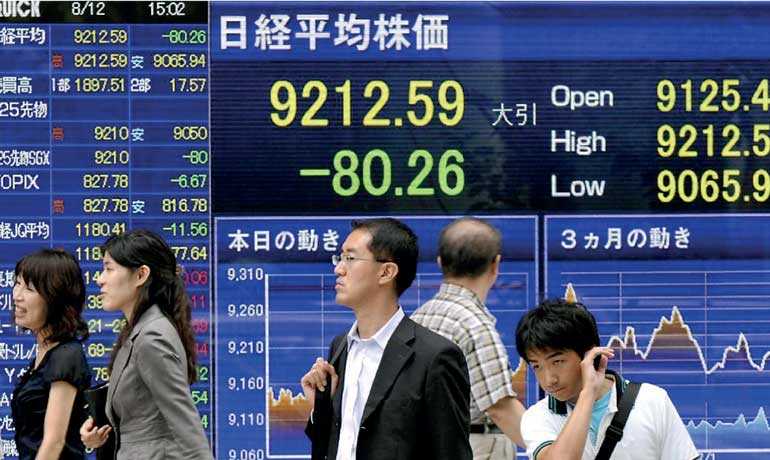Monday Feb 23, 2026
Monday Feb 23, 2026
Wednesday, 5 September 2018 00:00 - - {{hitsCtrl.values.hits}}

SHANGHAI (Reuters): Asian shares rose on Tuesday, with markets reversing earlier losses, but investors were apprehensive as the Sino-US trade dispute threatened to escalate this week and Argentina’s austerity measures rattled emerging markets.
MSCI’s broadest index of Asia-Pacific shares outside Japan was up 0.2%. Chinese blue-chips gained 0.9% after five straight days of losses, supported by real estate and banking stocks.
Japan’s Nikkei fell less than 0.1%, while Australian shares ended 0.3% lower.
Shares in Europe are expected to open lower on Tuesday following a mostly flat close on Monday. Spreadbetters see the FTSE 100 opening 0.09% lower at 7,498, the DAX opening 0.13% lower at 12,330, and the CAC 40 losing 0.09% to 5,409.
US stock market futures were higher on Tuesday, with S&P500 E-mini futures gaining 0.3% to 2909.25.
“The majors are the focus today rather than emerging markets,” said Greg McKenna, chief market strategist at Axi Trader in Sydney, noting that weak manufacturing data and the imposition of austerity measures in Argentina had drawn the market’s attention on Monday.
“Today it’s back to where is the US dollar going, and at the moment the vote in Asia has been it’s going to strengthen again,” he said.
“It’s utterly consistent that the US dollar is strengthening at the same time that US futures are rallying if what we’ve seen over the last two months, which is money being allocated to the US and away from other regions, continues.”
The dollar index, which tracks the greenback against a basket of six major rivals, was 0.14% higher at 95.272.
The dollar was up 0.07% against the yen to 111.15, while the euro was down 0.15% on the day at $ 1.1606.
Manufacturing surveys published on Monday showed mounting stress on factories across Europe and Asia as the outlook for global trade dims.
On Monday, Argentine President Mauricio Macri announced new taxes on exports and steep cuts to government spending in what he termed “emergency” measures to balance next year’s budget.
The Argentine peso closed 3.14% weaker on Monday and is expected to face further pressure in coming days.
Turkey’s Central Bank signalled on Monday it would take steps to combat “significant risks” to price stability, comments seen as hinting at interest rate hikes.
The lira, which has lost 40% of its value against the US dollar this year, was 0.3% stronger at 6.6000 to the dollar.
US President Donald Trump gave fresh impetus to trade worries at the weekend when he said there was no need to keep Canada in the North American Free Trade Agreement and warned Congress not to meddle in the trade talks. Trump was also reported to have said he is ready to impose tariffs on an additional $ 200 billion worth of imports from China as soon as a public comment period on the plan ends on Thursday.
“Markets are paying a little bit of attention to (Trump’s tariff threats) and wondering what might happen to European autos and, at the end of the day, what will happen with the Canadian side of NAFTA as well. There’s a lot of uncertainty there,” McKenna said.
And in a sign of new market risks, a Reuters poll pointed to a one-in-four chance that Britain will leave the European Union in March without a deal.
The yield on benchmark 10-year Treasury notes rose to 2.8640% versus its US close of 2.853% on Friday.
The two-year yield, which rises with traders’ expectations of higher Fed fund rates, touched 2.633% compared with a US close of 2.629% last week.
In commodity markets, US oil prices rose past the $ 70 per barrel mark, with production coming under pressure as two Gulf of Mexico oil platforms were evacuated in preparation for a hurricane. US crude was 0.5% higher at $ 70.15 per barrel.
Brent crude was flat at $ 78.16 per barrel after earlier trading lower on news that India had permitted its state refiners to import Iranian oil if Iran arranged tankers and insurance.
Gold was slightly lower as the dollar strengthened, with spot gold traded at $ 1,199.46 per ounce.